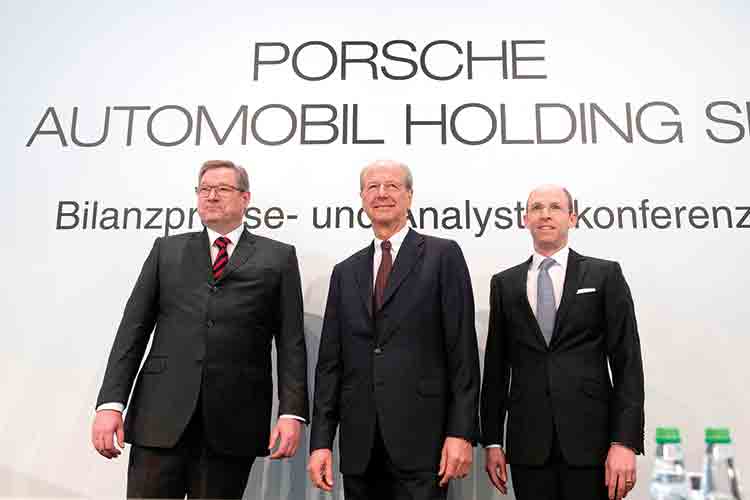German investors cheered by hopes of Brexit delay

Manfred Doess, Hans Dieter Poetsch and Philipp von Hagen at Porsche’s press conference in Stuttgart, Germany. Agence France-Presse
British lawmakers voted overwhelmingly last Thursday to seek a delay in Britain’s exit from the EU.
“The possible delay in the Brexit process as well as the renewed hope for a deal on the UK’s withdrawal from the EU seem to have given rise to more optimism among financial market experts,” ZEW President Achim Wambach said in a statement.
“Progress made in the negotiations between China and the US to end the trade war between the two nations may also have contributed,” he added.
Meanwhile the Porsche SE, the holding company controlling Germany’s Volkswagen, on Tuesday said it raised its voting rights share in the carmaker to 53.1 per cent from 52.2 per cent.
“We continue to believe that Volkswagen group has a significant potential to increase its value and that its current capital market valuation does not reflect this,” Porsche SE’s CEO Hans Dieter Poetsch, who is also the chairman of VW’s supervisory board, said.
Hans Dieter Poetsch and the members of the executive board Philipp von Hagen and Manfred Doess announced this during the company’s annual press conference at the Porsche museum in Stuttgart, southern Germany on Tuesday.
Hans Dieter Poetsch added that Porsche SE would increase its dividend by 26 per cent, to 2.21 euros ($2.51) per share and that the company expected a net income of 3.4 to 4.4 billion euros in 2019.
The ZEW research institute said its monthly survey showed economic sentiment among investors rose to -3.6 from -13.4 in February. Economists had expected an increase to -11.0. A separate gauge measuring investors’ assessment of the economy’s current conditions dipped to 11.1 from 15.0 in the previous month. Markets had predicted a fall to 11.7.
The stronger-than-expected ZEW reading bucked a recent run of weak data on the German economy, Europe’s largest, which stalled in the final quarter of last year, just skirting recession.
“Nevertheless, the ZEW Indicator of Economic Sentiment for Germany points to relatively weak growth in the first half of 2019,” Wambach added.
Figures released earlier this month showed industrial orders posted their biggest drop in seven months in January, a sign that the economy had a subdued start to 2019.
Many of the country’s traditionally export-focused companies have been hit hard by a cooling global economy and trade disputes triggered by US President Donald Trump.
They also face taking a hit if Britain’s exit from the European Union is disorderly.
A panel of advisers to the German government on Tuesday cut its growth forecast for this year to 0.8 per cent and warned risks related to Britain’s departure from the EU, trade disputes and a sharper than expected slowdown in China remained high.
Christoph Schmidt, one of the advisers, said: “The German economic boom is over but a recession is not currently expected due to the robust domestic economy.”
However a panel of advisers to the German government slashed its growth forecast for this year to 0.8 per cent and warned risks related to Britain’s departure from the European Union, trade disputes and a sharper than expected slowdown in China remained high.
The group that advises the German government on economic policy had in November forecast that Europe’s largest economy would expand by 1.5 per cent this year. The panel said on Tuesday economic growth had slowed significantly, partly due to problems in the chemical and auto sectors and warned that a spiral of protectionist measures had the potential to push the economy into recession.
But Christoph Schmidt, one of the advisers, said: “The German economic boom is over but a recession is not currently expected due to the robust domestic economy.” The group predicted the economy would grow by 1.7 per cent in 2020. The mood among German investors improved by much more than expected in March, a survey by the ZEW research institute showed on Tuesday, as a potential delay to Britain’s departure from the European Union buoyed sentiment.
British lawmakers voted overwhelmingly last Thursday to seek a delay in Britain’s exit from the EU.
“The possible delay in the Brexit process as well as the renewed hope for a deal on the UK’s withdrawal from the EU seem to have given rise to more optimism among financial market experts,” ZEW President Achim Wambach said in a statement. “Progress made in the negotiations between China and the US to end the trade war between the two nations may also have contributed,” he added.
Reuters



